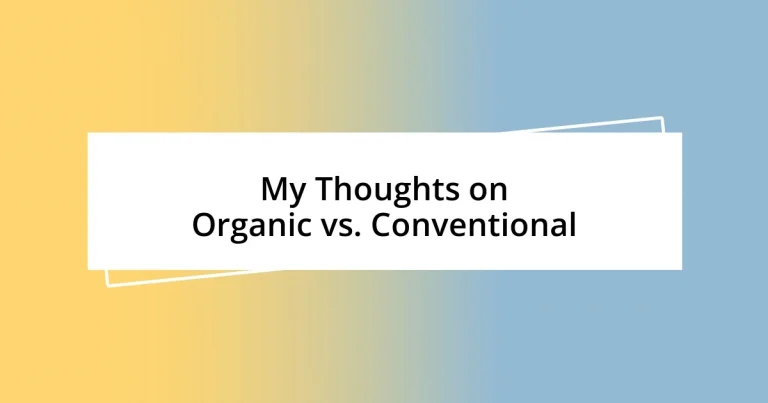Key takeaways:
- Organic farming enhances soil health and biodiversity, promoting a healthier ecosystem and more resilient agricultural systems.
- Conventional farming often relies on synthetic inputs and monoculture, which can degrade soil quality and harm the environment, raising concerns about sustainability.
- Consumer perceptions of organic versus conventional foods are influenced by health and environmental awareness, leading to emotional connections with food origins and community values.
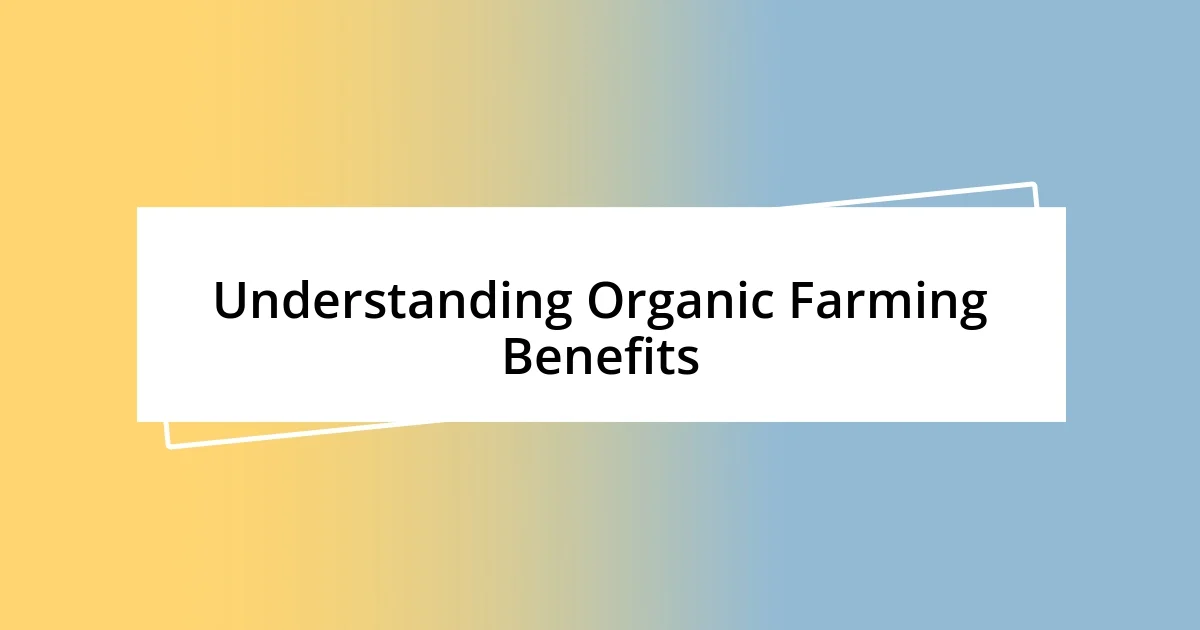
Understanding Organic Farming Benefits
One of the most striking benefits of organic farming is its positive impact on soil health. I remember visiting an organic farm where the farmer passionately explained how their practices enrich the soil. Every time I see flourishing crops rooted in nutrient-rich soil, I can’t help but wonder: how can we ignore the incredible link between healthy soil and healthy food?
Moreover, organic farming often promotes biodiversity. During a hike, I stumbled across a vibrant farm filled with different plants and animals harmoniously coexisting. It struck me that these diverse ecosystems not only support wildlife but also contribute to more resilient agricultural systems. Isn’t it amazing how organic practices can create a flourishing environment for all living beings?
Another benefit that resonates with me is the absence of synthetic pesticides and fertilizers in organic farming. A friend of mine switched to organic produce after learning about the harmful effects of these chemicals on our health and the environment. Seeing her commitment made me reflect on the choices we make and how they shape our health and planet—are we truly aware of the long-term consequences of what we put into our bodies?
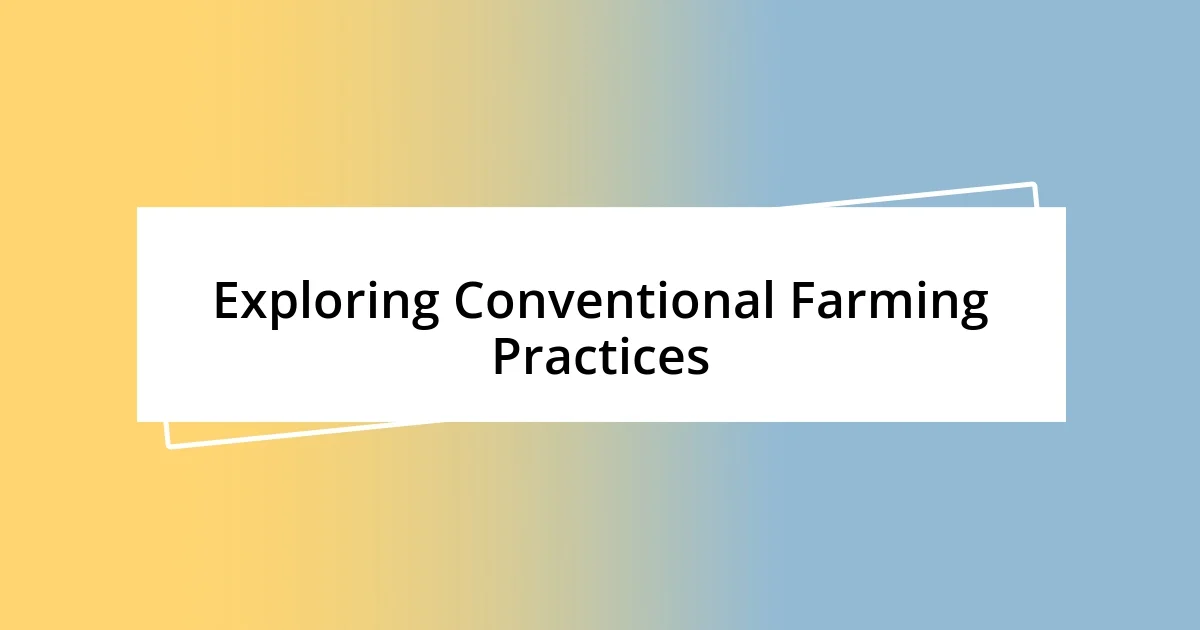
Exploring Conventional Farming Practices
Conventional farming, on the other hand, relies heavily on synthetic inputs. I recall my first visit to a large-scale conventional farm where I was surprised by the sheer volume of chemicals used. Chemical fertilizers and pesticides were common sights, all aimed at maximizing yields. It raised questions in my mind about the trade-offs we make for efficiency and profit. Do these practices ensure food security, or do they come at a cost to our environment?
Just the other day, while chatting with a local farmer, I learned that conventional methods often focus on monoculture, where one crop is grown extensively. This can lead to soil depletion and increased vulnerability to pests, creating a cycle that’s hard to escape. I reflected on how this practice might yield immediate results but could undermine the land’s long-term productivity. It’s fascinating how much farmers must weigh their choices, balancing short-term gains with future sustainability.
In my experience, while conventional farming can produce abundant crops, it often compromises ecological health. I once saw a report highlighting the adverse effects of run-off from synthetic fertilizers into waterways, resulting in harmful algal blooms. This made me think deeply about the interconnectedness of farming practices and environmental health. So, how do we reconcile the need for food production with the demand for ecological integrity? This ongoing challenge is worth exploring.
| Conventional Farming Practices | Key Characteristics |
|---|---|
| Fertility Management | Reliance on synthetic fertilizers to enhance crop growth. |
| Pest Control | Use of chemical pesticides to combat pests and diseases. |
| Crop Diversity | Often practices monoculture, which limits biodiversity. |
| Yield Focus | Prioritizes high yields and profit margins over ecological concerns. |
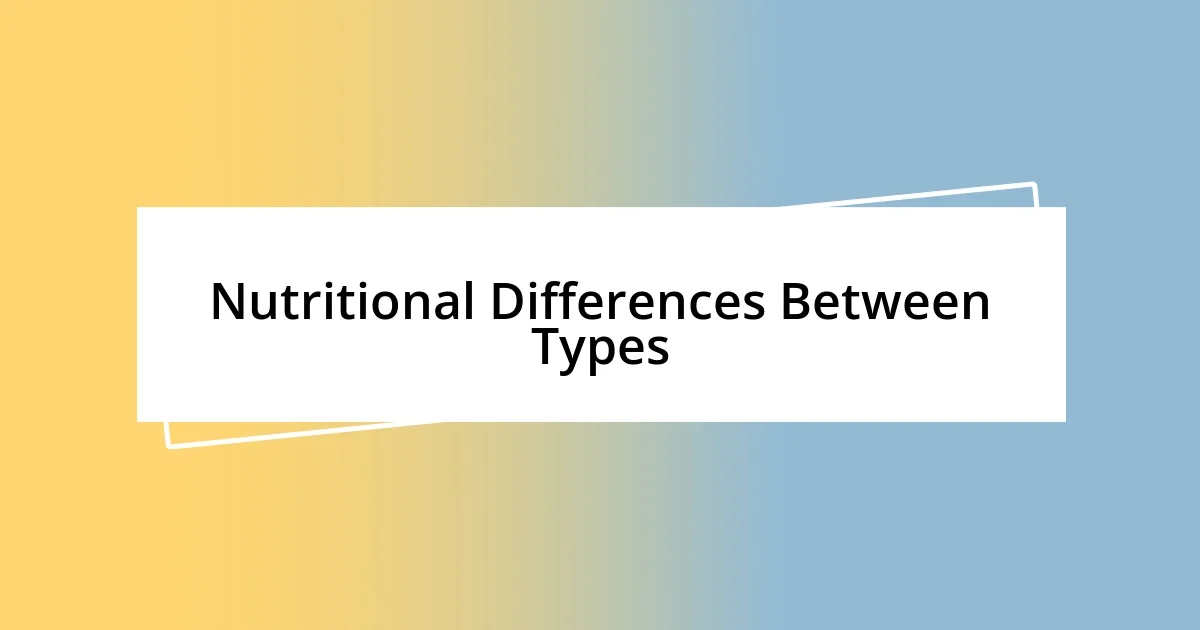
Nutritional Differences Between Types
When I think about the nutritional differences between organic and conventional produce, I recall the first time I tasted organic strawberries. They were bursting with flavor, unlike any others I had tried before. This experience made me curious about how cultivation methods truly impact nutrition. Studies suggest that organic foods can sometimes have higher antioxidant levels and are often devoid of synthetic residues, which I find reassuring.
Here’s a quick comparison:
- Higher Antioxidants: Some research shows organic produce may contain more antioxidants, which are crucial for combatting oxidative stress in the body.
- Lower Residue Levels: Organic foods are less likely to contain traces of harmful pesticides and chemicals.
- Nutrient Density: A number of studies indicate that organic crops can have higher nutrient densities, especially in vitamins and minerals.
- Flavor and Freshness: Many organic foods are harvested at peak ripeness, contributing to enhanced flavor profiles.
I still remember a cooking class where we used both organic and conventional vegetables in our dishes. I noticed that the organic tomatoes not only looked livelier but also added a richer complexity to the meal. It made me think about how our food choices can influence not just health but also our culinary experiences. I believe that the nutritional quality of what we eat isn’t just a technicality; it’s about celebrating the food that nourishes us and reflects our values.
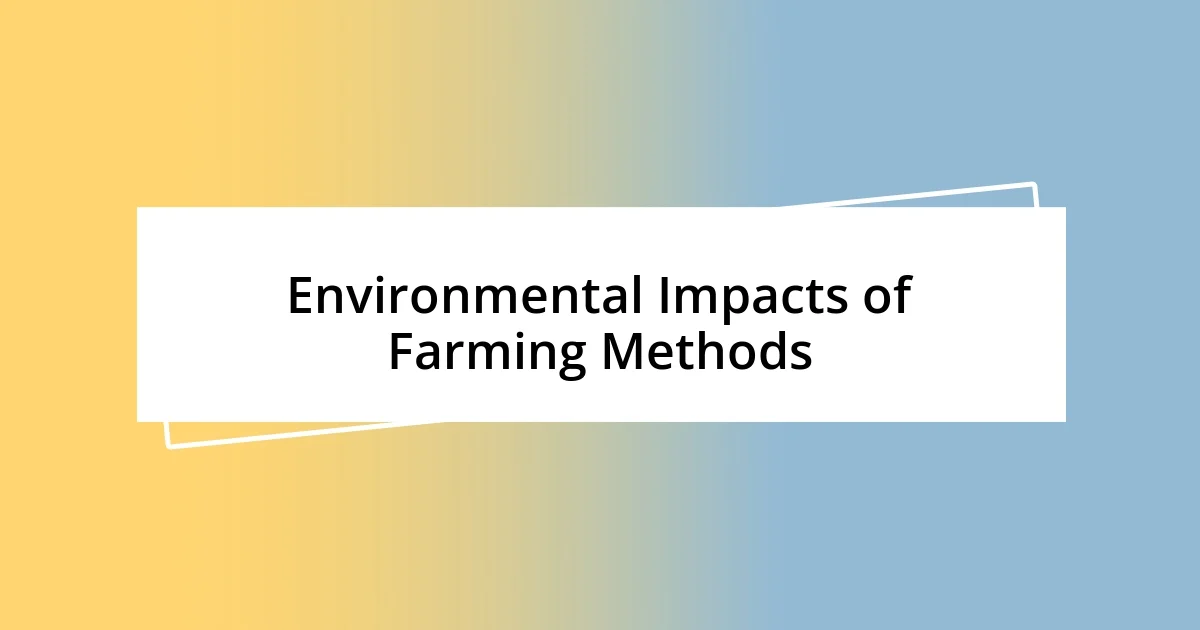
Environmental Impacts of Farming Methods
When considering the environmental impacts of farming methods, I’m often reminded of the vibrant landscapes seen on organic farms. During one of my walks through a friend’s organic orchard, it struck me how diverse the ecosystem was—pollinators buzzing, birds flitting about, and healthy soil teeming with life. This made me appreciate how organic farming practices, such as crop rotation and intercropping, support biodiversity and contribute to healthier environmental conditions. Isn’t it fascinating how these practices not only enhance production but also nurture the planet?
In contrast, I’ve seen the aftermath of conventional farming firsthand. I once visited a region where conventional farming practices led to soil erosion, leaving behind barren patches that told a sad story of depletion. The local waterways, which should be thriving, were cluttered with sediment and runoff from fields—a stark reminder of how chemical inputs can disrupt natural ecosystems. It made me ponder: are we truly willing to sacrifice our environment for short-term agricultural gains?
Reflecting on these experiences, I often find myself thinking about the long-term consequences of our farming choices. I remember attending a conference where experts discussed the significance of sustainable practices. The mention of how intensive farming contributes to climate change by releasing greenhouse gases and depleting resources really resonated with me. What legacy do we want to leave behind? This question continues to shape my thoughts on the agricultural practices we choose to support.
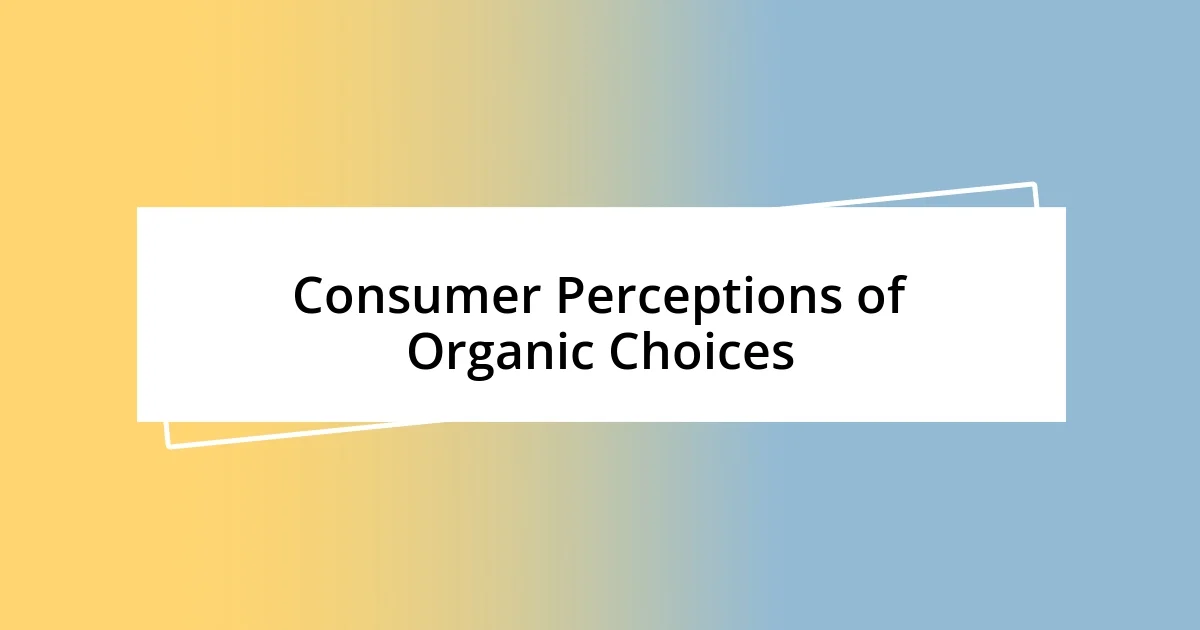
Consumer Perceptions of Organic Choices
Consumer perceptions of organic choices are deeply influenced by a mix of health consciousness, environmental awareness, and cultural beliefs. I remember chatting with a friend, who swears by organic products, about her decision to switch. She explained that, for her, it’s not just about what’s on the label; it’s about supporting farming practices that are less harmful to the planet. This made me wonder how many of us equate healthy living with our purchasing decisions in such a meaningful way.
Many consumers today feel a strong connection to the origins of their food. I often see people at farmers’ markets proudly sharing how they seek out local organic produce, believing that it’s fresher and more nutritious. I can’t help but feel a sense of camaraderie in those moments. It’s intriguing to think about how the stories of our food resonate on an emotional level, creating a sense of community around healthier choices.
Yet, there are still contrasting views in the marketplace. I recall a conversation with a neighbor who remains skeptical about the efficacy of organic food. She argued that price tags on organic items often don’t match their perceived benefits, questioning if they truly deliver on health claims. It’s fascinating to engage with such varying perspectives, as they reveal not just individual preferences but also the complexities of consumer decision-making in our food landscape. How do we find common ground in these differing perceptions?
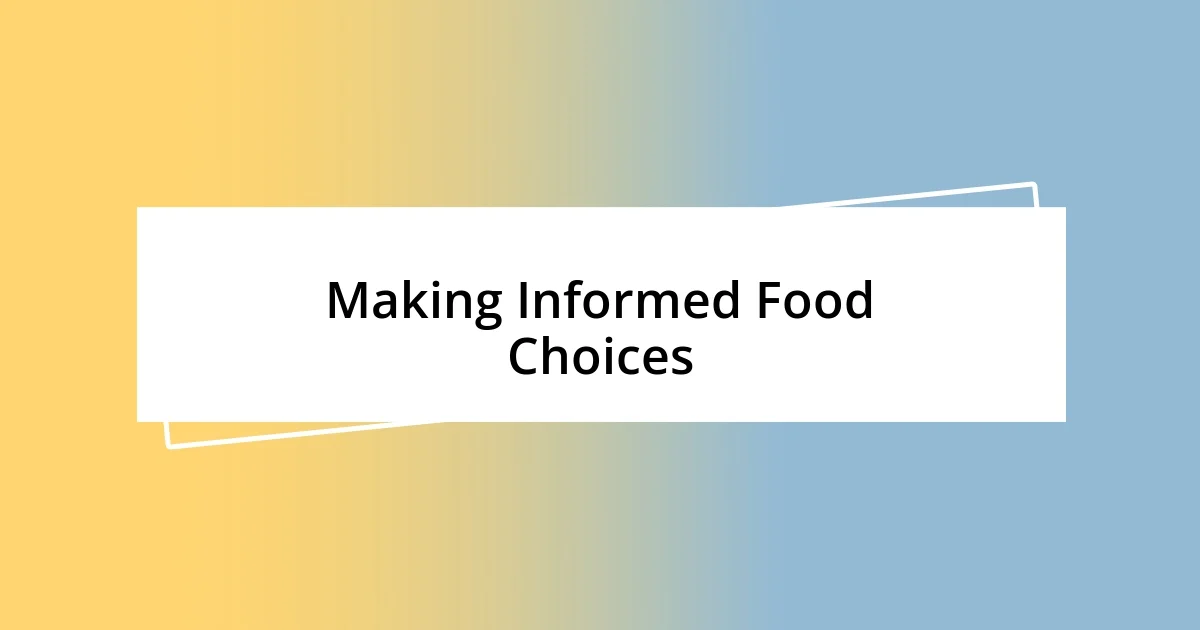
Making Informed Food Choices
When it comes to making informed food choices, I often reflect on my own experiences at the grocery store. I remember standing in front of the produce aisle, overwhelmed by the array of labels and certifications. Organic, non-GMO, locally sourced—each term felt like a puzzle piece in my quest for the healthiest food option. I began to realize that understanding these labels is crucial. What do they really mean for our health and the environment?
I still think about a conversation I had with my sister about her switch to organic. She mentioned her concern over pesticide exposure and how it motivated her to prioritize organic fruits and vegetables. Listening to her, I felt a strong urge to dive deeper into the implications of our food choices. Are we truly aware of what’s in our food? As we discussed it, I recognized that making informed choices isn’t just a personal endeavor; it’s a collective movement toward transparency in the food industry.
Navigating the world of organic versus conventional options can feel daunting, but when I think about the potential impact of my purchases, it becomes less overwhelming. I recall a local farmer sharing his insights about the benefits of organic farming, and how it can lead to healthier communities. Hearing his passion made me feel more empowered to choose wisely. So I often ask myself, how can we harness the power of informed choices to support sustainable practices and our own health? It’s a journey worth embarking on together.












